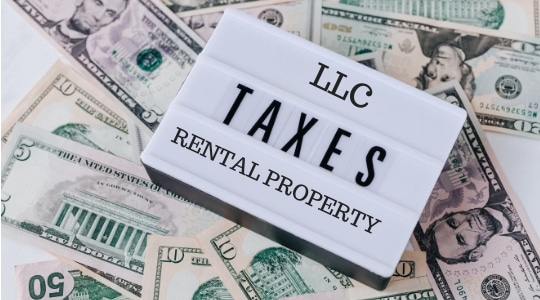Know This Before You Transfer Rental Property To LLC
Being a real estate investor, you might know about an LLC incorporation. And, how Incorporating your rental property under LLC protects your personal assets in case of a liability. But before you transfer your rental property to LLC, you must understand the impacts of doing it. That said, an LLC incorporation is not a favorable case for every rental property rental owner. And this can be a case with you.
Either you are about to buy a rental property or own it already, there are certain things you need to know before you transfer your rental property to LLC.
Financing Hurdles in Transferring Rental Property To LLC
Well, if you see there are two ways, an investor transfers the rental Property to an LLC. Either, or
- Transfer Rental Property To LLC While Buying
- Transfer Rental Property To LLC After Buying
Both these scenarios have a different impact on the financing aspect of the LLC owned rental property. In order to understand these impacts, let`s address these two scenarios individually.

When an Investor Transfer Rental Property To LLC While Buying
When you buy a rental property, you have an option to buy the property and instead of transferring it on your name, you can directly transfer it to your LLC. Investors do so to save on the double taxation on Title transfer. Let’s see how transferring rental property to LLC while buying affects the financing part.
Mortgage Challenges on LLC Owned Property
Transferring Rental Property to LLC while buying is not a concern if you are making a cash purchase. The real issue arises if you have to finance this purchase. If you are to buy a rental property and transfer it in your own name, you can go the conventional route of financing.
But, if you are buying a rental property under LLC, you can`t go for conventional financing. Conventional Financing is primarily reserved for individuals and not for entities. However, that doesn’t mean you can`t finance a property owned by an LLC.
You can certainly finance a rental property owned by an LLC. Instead of conventional financing, you have to go for investment property loans. Your options include Asset Based Loans like the portfolio loans, hard money loans and loans from local community banks.
“Having a Property in LLC, you will miss out on loans that are backed by Fannie Mae and Freddie Mac. Also, you even can`t take advantage of government backed loans like the FHA and the VA loans.”
Cons of Getting a Mortgage on LLC Owned Property
Personally, I don’t feel you are getting any benefits of LLC in the case of financing an LLC owned property. But let`s address some assumptions an investor makes or feels as benefits in financing an LLC owned Property that are actually cons.
- Personal Liability
Even if you feel that you hold no personal liability on an LLC owned property, you are wrong. Because, when your LLC is new and has no established financials, all the asset based lenders require a personal guarantee. And your case is no different.
It is only after you build a reputation and some strong credit in your LLC that you can access to LLC Credit lines which is a non recourse loan and requires no personal guarantee.
- Protecting Your DTI (Debt To Income Ratio)
Most investors go for an LLC because they feel the mortgage via LLC is a business loan and will not count as a personal debt. No, it is not the case always. It feels nice to assume that you are protecting your DTI when financing through an LLC.
But, even if you own the property via an LLC, it still bears a personal guarantee under your name. This means it is your debt and will certainly count under your Debt to Income Ratio if you have to take out loans to finance more rental properties in future.
That said, if you don’t have a solid credit and wish to buy more investment properties in future. Keep a close eye on your credit ratings.
- High Annualized Percentage Rate (APR)
Not a kind of assumption, but a con of buying an LLC owned property. When you finance an LLC owned property, you will get a high APR as compared to what you get with normal conventional loans on individual owned properties. The APR can be as high as 1% to 2 % which clearly is a downside if you are obtaining a mortgage on an LLC backed property.
When an Investor Transfer Rental Property To LLC After Buying
This is the most common case when an investor buys a rental property in their name and then transfers it to the LLC. The most obvious reason investors do this is to limit their personal liability if in case the tenant sues them. With an LLC, tenants can`t go behind your personal assets.
“But do you know the impact of transferring your rental property to an LLC when it has a mortgage on it? ”
Effect on Mortgage When You Move The Rental Property To LLC
If you have previously taken out a conventional or an individual based mortgage to buy a rental property. Then, there is a clause as ‘Due On Sale’ that you agree to in the promissory note at the time closing. The clause requires you to pay the due mortgage amount in full if you are to transfer the title or sell your interest to somebody (in this case, an LLC).
And, if you try to sell or transfer without clearing your due mortgage amount, your lender is eligible to initiate remedies permitted under the law. So, if you are considering transferring your rental property to an LLC, you have at max 30 days to clear the due amount after the lender serves you a notice of acceleration.
“Are you transferring Your Rental Property To an LLC when your Mortgage is Due? Pay the due amount within 30 Days or see your Property going into the Foreclosure.”
Well a sense of relief to those investors whose loans are backed by Fannie Mae and taken after 31st May 2016. You can transfer your rental property to an LLC without worrying about Due on Sale Clause. Though it has some caveats.
- LLC should be owned by the Original borrower of the Loan and if in case of Partnerships in the LLC, the major stake should be owned by the original borrower.
- The transfer of the property to the LLC should be done after 1 year of owning the property.
However, Fannie Mae may have allowed the LLC transfer. But all this majorly depends on the servicer or the lender of your loan. You must check with the lender before making this transition and inform the same before transferring the rental property to an LLC.
Even if your mortgage lender will approve you to transfer your rental property to an LLC. But, don’t expect to carry over the benefits like the low interest rates on the mortgage that you had when the property was in your name. Furthermore, be ready to pay the mortgage assumption fee to the lender.
Tax Consequences on Transferring Rental Property to LLC

You can enjoy the benefits of being an incorporated entity with an LLC incorporation. Protection from a personal liability and paying taxes at your own tax slab instead of a corporate tax rate. And even get that straight 20% deduction because of a pass through taxation entity.
However, the thing here is that you may not have an immediate tax consequence on transferring rental property to LLC. But you can have tax consequences later. And if you have more than one member in the LLC other than you, things can really become complicated.
Imagine you bought a $300,000 investment property which now worths $450,000. A Capital gain of $150,000. You transfer this property to an LLC. Now either you assume the liability of this tax gain or your LLC has to bear this.
Do you know if you have to transfer back your llc owned property in your personal name, you become liable to pay sales tax on this. This transaction will be considered a sale in the view of the IRS. Furthermore, other taxing bodies like municipalities will also charge high fees to make these title transfers.
How Many Rental Properties To Have an LLC?
Well, you can transfer your property to LLC even if you have just one rental property. But that isn’t feasible unless you have a lot of your skin in that rental property. That said, if you have a mortgage on a rental property and you have just 20% of your own equity.
You have really nothing big on the line. Consider having an LLC incorporation when you have lots of your personal assets in the play and you own several rental properties in your name.
In my opinion, when you own more than five rental properties, go for an LLC incorporation. Why am I saying this? Because when you own more than five properties, it becomes difficult to finance more rental properties the traditional way.
That is when an LLC incorporation favors you to score the business loans. The Commercial Business Lenders love providing financing to LLCs and are much concerned for the profitability of your portfolio rather than going out for your personal debt to income ratio.
How to go with the LLC For an Out of State Property?

If you have invested in an out of state property and wondering which state to form an LLC, either your home state or out of state? Then the short answer is anywhere you want. You can register your LLC in any state you want. The thing is go with the state that provides more financial and legal benefits over the other state.
However, if you choose to go with an out of state LLC, you are required to also register this LLC as a foreign LLC in your home state. The caveat is you have to now pay LLC filing fees and other related fees in both these two states.
If you own an out of state property, it is suggested to form an LLC in the state where your business is making money. And if it is the anonymity that you are forming an LLC for, it is altogether a different ball game.
Should You have Separate LLC For Each Property?
Having a separate LLC for each of your property is definitely a good idea if you can manage all the paperwork for so many LLC`s. After all, what can be more better than putting all the eggs in different baskets? Even, if you ask this same question from an attorney, he would happily advise to create separate LLCs for each property. For every extra LLC Filing, the attorney will receive more money.
But imagine yourself having 10 rental properties. This means you have to have 10 different separate bank accounts for each LLC and not to forget the cost of running each LLC. Don`t you think it will become very difficult to account for all these LLC`s?
It will be much better if you diversify the risk accordingly and have your rental properties bundled in two or three LLC`s at max. However, it is totally a personal call and depends upon your level of risk tolerance.
LLC Setup and Recurring Costs
Having an LLC is not a cheap affair. Not only it costs you money to set up an llc but having a LLC incorporation also has annual recurring costs. And, if you are a small rental business owner, it really doesn’t make sense at all to have a LLC incorporation.
It doesn’t seem to be a good idea that you are making just $2,000-$3000 in net profits from your one rental property annually and pay $1000 in LLC fees every year.
- The Biggest Expense while creating an LLC is filing the articles of organization.
- Then comes the formation of LLC Operating Agreement.
- Third is publishing the notice of intent in the newspaper.
- Obtaining all the licenses and permits according to your state.
- Finally, transferring the title of your property to LLC (Quit Claim Deed or Warranty Deed) and opening a separate business account for LLC.
“ An Quit Claim Deed is fine if you are the only member in the LLC. But if you are going for a multi member LLC, better to go with a Warranty Deed.”
Do you Know, how much the above mentioned expenses account for? These are just the steps of forming the LLC. And when you have an LLC, you are also required to pay LLC taxes, Reporting Fees and the Registered Agent Fees on an annual basis. You shell out anywhere between $50-$3000 in forming an LLC and another $50-$4500 in annual recurring costs, all depending upon your state.
Costs Price
Filing Article of Organization $40-$500
LLC Operating Agreement $350-$1000 (When You Consult a Lawyer)
$39.99 (With Rocket Lawyer)
Notice of Intent $40-$100
Quit Claim Deed $100-$200
$39.99 (With Rocket Lawyer)*
Annual LLC Taxes $0-$800
Annual Reporting Fees $50-$400
Registered Agent Fees $100-$300
Creating an LLC costs a lot of money. But with Rocket Lawyer, you can save your $$$. Get all Legal Documents at one place by paying just $39.99/month for all docs in Rocket Lawyer Library. Your LLC Sorted With Rocket Lawyer
Some Common Practices When Transferring Rental Property To LLC
- Stay away from putting personal guarantee for an LLC Loan and try to seek non recourse loans only.
- Never use your personal credit card or any card in your name to fund a purchase in your LLC.
- When taking out a mortgage on LLC owned property, never sign any documents in your own name.
- If you have changed the ownership of your rental property to LLC, remember to also change all the existing leases already in the place.
The Bottom Line
There you have it all for having your rental property transfer to the LLC. But now the question, should you do it after all such challenges? Yes, you can transfer your rental property to LLC. But the thing is what are you trying to achieve with this?
In my opinion LLC is unnecessary complication if you are just starting out. You are fine with a sole proprietorship. Simply, have a landlord insurance with an umbrella policy. And when you have accumulated more than 5-6 rental properties in your portfolio, you can consider going for an LLC incorporation.



thank you for this article. i was miss lead on when the best time to convert my property to an LLC.
now i am very knowledgeable on becoming a better property owner.
I`m glad Frances that you find the article helpful. All the best for being a property owner